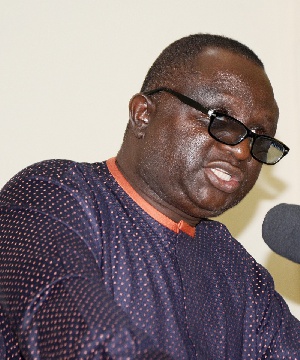 Prof. Olawale Albert, University of Ibadan, Nigeria
Prof. Olawale Albert, University of Ibadan, Nigeria
A Professor of Peace and Conflict Studies at the University of Ibadan, Nigeria, Isaac Olawale Albert, has advised African countries to disband political vigilante groups as they could grow and turn into terrorists to disturb the peace on the continent.
Citing the rise of Boko Haram as an example, he said the group began in 2002 as a small gang that was politically motivated to frustrate opponents, but grew into a huge radicalised one, terrorising civilians because steps were not taken to disband it.
Prof. Albert, delivering the 5th Kofi Annan-Dag Hammarskjold Annual Lecture in Accra yesterday, stressed the need to do away with such groups at the grassroots level before they turned their ills on society.
He said though there were early warnings that Boko Haram could become an uncontrolled gang, politicians who benefitted from their activities failed to pay attention or sought support from peace organisations to deal with them.
“In the initial stages, we wrote extensively and our paper warned about the impending problems, but the lessons were not taken. It could have been taken as an early warning system by Nigeria, but the federal government did not see any need to come in with any peacebuilding plan,” he said.
According to Prof. Albert, who is also a senior lecturer at the Kofi Annan International Peacekeeping Training Centre (KAIPTC), vigilante groups could become very dangerous terrorists when they feel used, abandoned and neglected by their godfathers.
He explained that Boko Haram turned their troubles on civilians after their sponsors neglected them; “a situation which was taken advantage of by one Muhammed Yusuf to radicalise the gang and turn them against the Nigerian society.”
On plans to strengthen peace -building in Africa, Prof. Albert expressed concern about what he described as lip service paid to peacebuilding on the continent by some organisations such as United Nations (UN), African Union (AU) and Economic Community of West African States (ECOWAS).
He said if African countries were truly committed to peace-building, then they should take keen interest in resolving socio-economic challenges confronting their people.
“Attention should be given to three types of peacebuilding: political peacebuilding, which has to do with putting in place a political and legal system supportive of sustainable peace and development, and structural peacebuilding which include managing the structure of society in a manner that could ensure inclusivity whether at social, economic, political or gender level,” he explained.
Prof. Albert further noted that African countries could not make progress in peacebuilding unless they also handle peacebuilding in a social perspective which include building relationships at different strata of society.
He warned that if the economic challenges on the continent were not addressed urgently, they could frustrate the youth and turn them into insurgence against states.
The Canadian High Commissioner to Ghana, Ms Heather Cameron, called for regional engagements to formulate good polices and promote quality leadership on the continent as part of efforts to ensure peace.